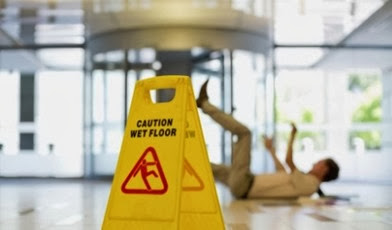From the Metro 29/11/13:
A police community support officer (PCSO) is suing the owner of a derelict school building after she tripped and injured her knee while responding to a report of a break-in.
Pauline Harrison, 53, […] sent a letter to landowner Lightflask Ltd alleging that the firm failed to display warning signs outside the property […].
She says she suffered ‘soft tissue damage’ to her right knee when she fell over the 3ft high wooden fence in 2009 and is also claiming for a £14 prescription and £102 physiotherapy charge.
That’s not a prescription for spectacles, right? Just kidding. But perhaps the biggest question in all this is exactly how a person is able to fall over a 3 foot high fence in the first place. That’s quite an achievement.
Merseyside Police said they did not approve of the claim but that it was a private matter for the individual.
A spokesman for Lightflask Ltd has warned that this could set a dangerous precedent.
‘I don’t think people expect to be sued by somebody working in the police who claims injury in the course of their duties,’ he said.
People rarely expect to be sued, period. But it happens. Whether it should routinely happen in these types of situations brings public policy considerations into play.
‘Surely the nature of the job carries inherent risks and one obviously grows concerned that in this case the claimant is a community support officer and there must be a worry that these support officers may not be trained to the level of a regular officer.
Actually, I’m not sure that’s the point at all. The main point of the story, I think, isn’t so much that it involves a PCSO rather than a fully-fledged PC, but rather that this highlights the fact our emergency services are being increasingly litigious. But how concerned should we be about police officers regularly bringing claims against landowners from slip and trip injuries obtained whilst carrying out their routine duties? How many of these types of claims are succeeding? Is the law sufficiently sophisticated to properly consider the circumstances in which these injuries are occurring so as to give rise to a just result?
The police (and that includes PCSOs) are there to protect the public and enforce law and order. Like all emergency services, they are charged with responding to emergency calls in dangerous and difficult circumstances. Being in the line of danger unfortunately goes with the territory.
What’s more, it’s reasonable to expect police officers, including PCSOs, to be sure-footed, observant and capable of exercising common sense. But the scope of that expectation is necessarily affected by the prevailing circumstances in which that officer finds themselves. Clearly it’s vital for any claim brought by a member of the emergency services relating to an injury suffered whilst on duty to be assessed in the full and proper context in which it occurred. This means keeping the circumstances of their coming onto the land in question very much top of mind.
However, I think the law is already flexible enough to manage these difficult situations. Whilst landowners generally owe people who come onto their property (invited or otherwise) a duty of care to protect them from personal injury, that protection is subject to the rigours of the legal test for negligence. That test essentially considers whether a duty of care is owed to the claimant in the circumstances, whether that duty was breached, whether there was a causal connection between that breach occurring and the injury complained of, and whether the foreseeability of that injury occurring as a result of the breach was too remote.
In point of fact, in Higgs v Foster [2004] EWCA Civ 843, where a police officer in pursuit of a suspected criminal fell into an uncovered inspection pit at night, it was held that the landowner owed no duty of care to trespassers in the circumstances. This was because the landowner did not know, nor did they have reasonable grounds for believing, that a trespasser would enter his premises and come into the vicinity of the pit.
What’s more, in Donoghue v Folkestone Properties Ltd [2003] EWCA Civ 231, it was held that the duty owed to trespassers must be determined by reference to the circumstances at the time the alleged breach of duty resulted in the injury to the trespasser. For instance, injuries flowing from a police officer forcing his way onto property in hot pursuit of a suspected criminal might be treated very differently to injuries suffered by the same officer who carefully made his way onto open land, uninhibited by walls or fences, to carry out routine enquiries. Potentially, applying the requisite legal tests for negligence claims in both of these different scenarios could give two very different results. Put simply, the law is readily able to take proper account of the context in which claims arise.
So maybe these fears of claim-happy cops is nothing more than media scaremongering after all.
‘I think the public seem to be at risk of being on the receiving end of litigation every time an officer does his or her duty and more so if that officer is not full-time or has not received the level of training commensurate with the role.’
I don’t know the full facts here, but it seems strange to suggest that a greater level of training would have prevented this; I’m not sure that ‘climb carefully over 3 foot high fences rather than fall over them’ is a lesson offered at Hendon Police College.
Earlier this year, PC Kelly Jones dropped a compensation claim that she was seeking from a Norfolk garage after she tripped on a kerb.
I covered the original story on Law Actually; let’s overlook the fact I hadn’t subsequently heard the claim had been dropped.
Ahem.

No comments:
Post a Comment